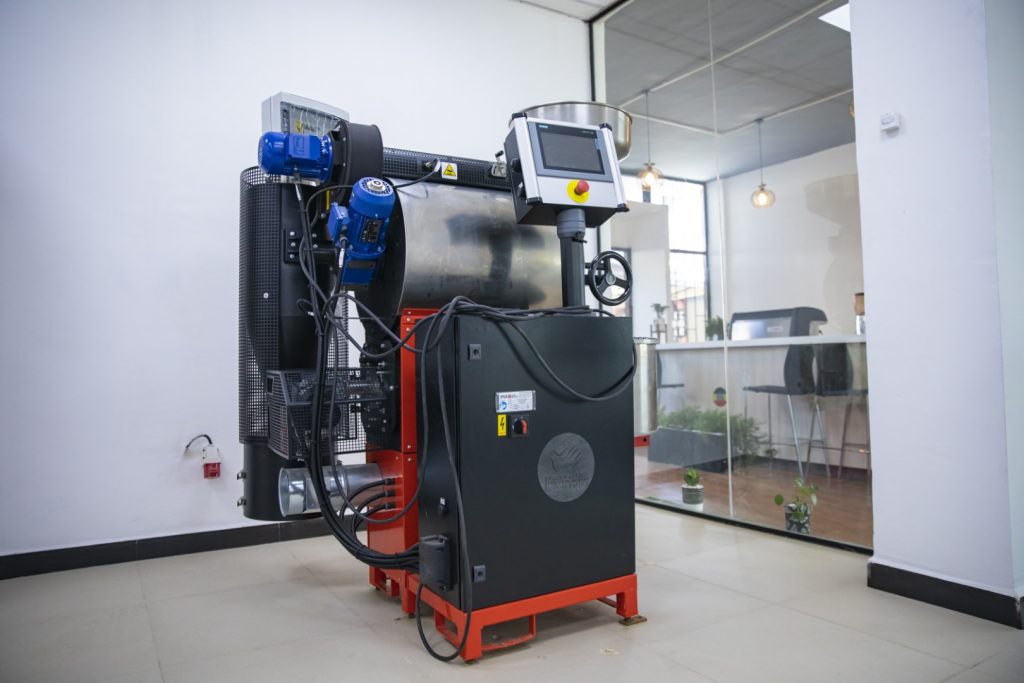Here students will learn how to undertake coffee roasting and packaging, and use of different equipment of roasting, packaging to obtain a good final product. In this laboratory, trainees will learn how to undertake coffee roasting, grinding and packaging at larger scale.
- Training on Roasting: Ideal roasting requires proper machine with energy source of electricity and gas that is consistent for industrial size (considered with a 2 kg batch of green coffee, at a minimum, as per Illycaffè evaluation), where it is possible to monitor the whole process and make the roasting uniform with the support of software aimed at monitoring the level of temperature, speed of the drum, etc. as well as at recording different information. There is critical demand for skilled roasters -with basic skill of computer interfaced roasting- that can determine the levels of differentiations, and the causes and effects of light roasting, medium-dark roasting, dark roasting, etc. Therefore, training on fundamentals of roasting that provides general concepts of heat conductivity or transfer; roasting procedures and mechanics; roasting adjustment, calibration and blending; evaluating the profiles of roasted beans; adjusting the roasting profiles or duplicating, etc. is very much demanding. This training can be demanded by Industrial processers who want to add value to their production, as well as exporters, commercial farmers, coffee roasters, Baristas, researchers, students, university instructors, coffee entrepreneurs and beneficiaries from the neighboring countries.
- Training on grinding: This refers to use of grinding machine or mortar to change the roasted coffee in a way that the coffee is consistently uniform. Currently, there are different types of coffee grinding in Ethiopia for different preparations – Jebena Buna, filter coffee, espresso, for which, ideal grinding machine is required. The choice of the grinder is determined by technology – rolls or blades, i.e., flat blades or conic blades. However, there is no as such standard training institute with its specific science and associations with the different coffee types. Therefore, training on grinding skills, dosing and tamping, skills on the choice of different kinds of grinders.
Among others, training on grinding, dosing and taping helps to attain basic understanding of:
• Terminologies to correctly identify all key parts of grinder (hopper, espresso machine and adjustment collar, dosing grinder component parts chamber, fork, on/off switch) and espresso machine including switches (steam wand & tip, port-a-filter handle, group-head, dispersion screen & gasket, drip tray, gauges, hot water spout, on/off switch, continuous/AV buttons)
• Acceptable range (per unit) of coffee used in espresso, and how distribution of coffee grounds affects extraction.
• Impact of tamping on distribution, and extraction flow
• Description and demonstration of the basics of dosing, distribution and tamping and their impact on extraction
• Correct dosing action to achieve correct input with minimal waste
• Demonstration of good dosing and distribution technique to keep dose consistent from one espresso to the next and to minimize channeling
• Calibration of a grinder to produce an espresso that falls within SCA standards. The grinder should be purged between adjustments
• Identification of the impact of grind size on the final shot
• Description of how the grind affects shot times; how to correct a grind to produce an espresso in 20-30 seconds.
• Demonstration of a good tamping technique using a hand tamper
This training can be demanded by baristas, café managers, entrepreneurs, coffee quality managers, roasters, cuppers, coffee traders, etc.
- Training on Packaging: This activity is binding as coffee powder cannot be marketed without ideal packaging with standards criteria of health, shelf life and marketability. Ideally, a packaging process which accommodates the time needed for coffee to de-gas. As there is no such training service on skill in coffee packaging, despite certain exercises being made by the Ethiopian roasters’ association, advanced level training would make significant difference onto the value-chain and is found very important. The current system lacks standard and advanced level theme, and does not consider associated issues such as quality of packaging material, shelf life, storage quality, etc.
